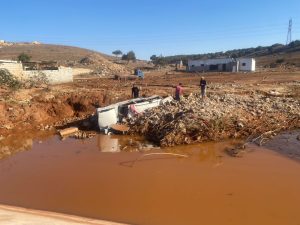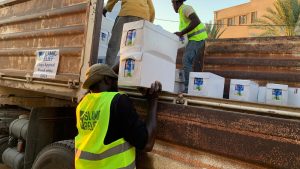Islamic Relief launches appeal as catastrophic floods sweep Libya
Islamic Relief is appealing for support to help people suffering as unprecedented flooding devastates eastern Libya.
At least 20,000 people have died but around 10,000 more are still missing. The death toll is rising by the hour, as more information emerges.
 Image: Flooding has caused widespread destruction in Derna.
Image: Flooding has caused widespread destruction in Derna.
Donate Zakat to Libya Floods Appeal
The situation on the ground:
- Around 20, 000 people are feared dead
- 3, 000 people have died in Derna alone
- 150 homes have been destroyed
- 300, 000 children have been affected
- 2, 200 buildings have been damaged
- Almost 36, 000 people have been displaced
Flooding hits Derna like a ‘Tsunami’
Some communities are completely cut off and inaccessible.
Eye-witnesses report that vast parts of Derna city are completely destroyed and some areas have been swept into the sea. Over 1,500 Derna residents are feared to have died in the disaster, which has been described by Libyan government minister Hisham Chkiouat as, “like a tsunami” hit the area.
Benghazi, Soussa and Al-Marj cities are also affected by the flooding. Across the area, hundreds of thousands of people are affected and many have lost their homes.
Islamic Relief’s response
Islamic Relief is working with local partners on the ground and delivering urgently needed relief like Mattresses and Blankets,
We will also be delivering food packs, and other vital aid to affected communities. We have already committed an initial £100,000 to provide emergency aid.
The international community and international agencies must grasp the level of devastation. International assistance is urgently required for Libya.
- We call on all Governments to increase their pledges to aid organisations providing humanitarian responses in Libya.
- We call on the international community to respond immediately to flood-stricken families’ urgent needs, including emergency shelter, food, clean water, cash transfers, and primary healthcare.
- We call for a joint up Humanitarian response that must include a whole systems approach to the disaster from UN, INGO and NNGOs for flood-affected victims, considering the variable around the vulnerabilities of affected communities.
Islamic Relief has launched an appeal to assist disaster-stricken families in Libya. Donate to our Libya Floods Appeal now.
 Image: Islamic Relief staff distributing aid packs in Derna
Image: Islamic Relief staff distributing aid packs in Derna
Libya’s Climate Crisis
Libya is experiencing a rising trend in the frequency and severity of disasters and environmental degradation, encompassing phenomena such as floods, sandstorms, land/mudslides, and desertification. These challenges are expected to worsen in the face of ongoing climate change, characterised by projections of a hotter, drier climate across all the region.
In terms of greenhouse gas emissions, Libya stands out as having the highest per capita emissions in Africa, averaging around 8.5 tons of carbon per person annually. The bulk of these emissions emanate from electricity production and the oil sector, primarily due to the release of natural gas into the atmosphere as waste.